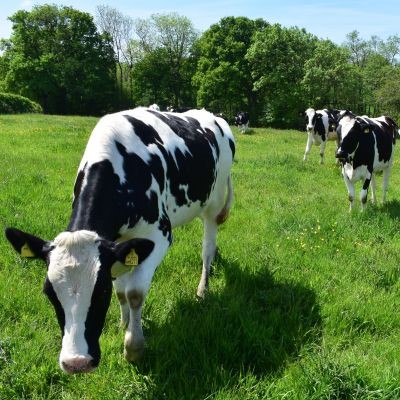A sit down with Daniel Sandars
05/03/2021

Can you tell us more about your area of research and your role at Cranfield University?
Broadly speaking, I am an Operational Researcher who blends the sciences of farming, the environment, and better decisions to model agricultural systems and provide quantitative insights to inform policy and practice. This involves using the optimising linear programming whole-farm model ‘Sfarmod’ to predict future land use under change, such as a different climate, technology, markets, payments or regulations. It partly also means applying environmental Life Cycle Assessment to choices in food production and consumption. Finally, it also partly involves data mining.
How long have you worked at Cranfield and how has your role changed within that time?
I’ve worked here for fifteen years starting first at the Silsoe campus for a few months before our group was brought over to the Cranfield campus. As a group, many of us came from the Silsoe Research Institute when that was closed down. I’ve always enjoyed working in my research area or should that be ‘field’.
How does your work link with industry?
The work we do here at Cranfield is very applied. We typically work with stakeholders from both the farming industry and policymakers. Our clients range from industrial levy bodies to government departments to research councils. For example, we have recently worked with a group of pig producers and a chain of cattle vets looking at the environmental impact of green technology and better information.
How do you bring students into your work?
Many of our research projects are presented to the students as real-life case studies on our courses. At times, we can also facilitate student projects in our research
What excites you most about your role?
For me, one of the highlights is donning a pair of overalls and visiting farms and farmers to contextualise our role in working for the better and helping science into practice.
What do you think is the biggest challenge within your role?
One of our challenges can be access to data and also the related challenge of physical storage of earlier time-series reference materials. Another challenge can be networking within a sparse professional peer community.
Can you highlight a unique experience you have had while working at Cranfield University?
It is a unique experience the way I can combine farming interests with intellectual life as well as rural pursuits with urban conveniences. The only improvements would be if we had a beach and a mountain in the area. That would be ideal!
What are you most proud of?
The farming industry – you can’t laugh at farmers with your mouth full.
Do you often work collaboratively with other areas of the University?
All of my projects are collaborative within the University and beyond. At Cranfield University I mostly collaborate with other academics within the School of Water, Energy and Environment.
If you could do an MSc at Cranfield University, which one would you do and why?
I think I would like to try a course from the School of Management. I think it would be great to investigate some of their courses to learn more about the supply and logistics side to be able to apply this to my Life Cycle Assessment work in the food chain.
What is the best advice you’ve ever received?
Steve Jobs “Life can be much broader once you discover one simple fact: Everything around you that you call life, was made up by people that were no smarter than you. And you can change it, you can influence it… Once you learn that, you’ll never be the same again.”
Who would you like to exchange roles with at Cranfield for a day?
If we had a tea trolley, I’d love to tour the campus catching a few seconds with everyone to briefly admire the great work they are doing and reward them with a free crunchie bar! Failing that I’d love a day in marketing and public relations to help share our science and our success with the world!
Categories & Tags:
Leave a comment on this post:
You might also like…
Company codes – CUSIP, SEDOL, ISIN…. What do they mean and how can you use them in our Library resources?
As you use our many finance resources, you will probably notice unique company identifiers which may be codes or symbols. It is worth spending some time getting to know what these are and which resources ...
Supporting careers in defence through specialist education
As a materials engineer by background, I have always been drawn to fields where technical expertise directly shapes real‑world outcomes. Few sectors exemplify this better than defence. Engineering careers in defence sit at the ...
What being a woman in STEM means to me
STEM is both a way of thinking and a practical toolkit. It sharpens reasoning and equips us to turn ideas into solutions with measurable impact. For me, STEM has never been only about acquiring ...
A woman’s experience in environmental science within defence
When I stepped into the gates of the Defence Academy it was the 30th September 2019. I did not know at the time that this would be the beginning of a long journey as ...
Working on your group project? We can help!
When undertaking a group project, typically you'll need to investigate a topic, decide on a methodology for your investigation, gather and collate information and data, share your findings with each other, and then formally report ...
From passion to purpose: My journey at the Pinnacle of Aviation
By: Sultana Yassin Abdi MSc Air Transport Management, Current Student Born and raised in the vibrant landscape of the UAE, with roots stretching back to Somalia, my life has always been ...







A great read. Interesting mix of academic and applied.